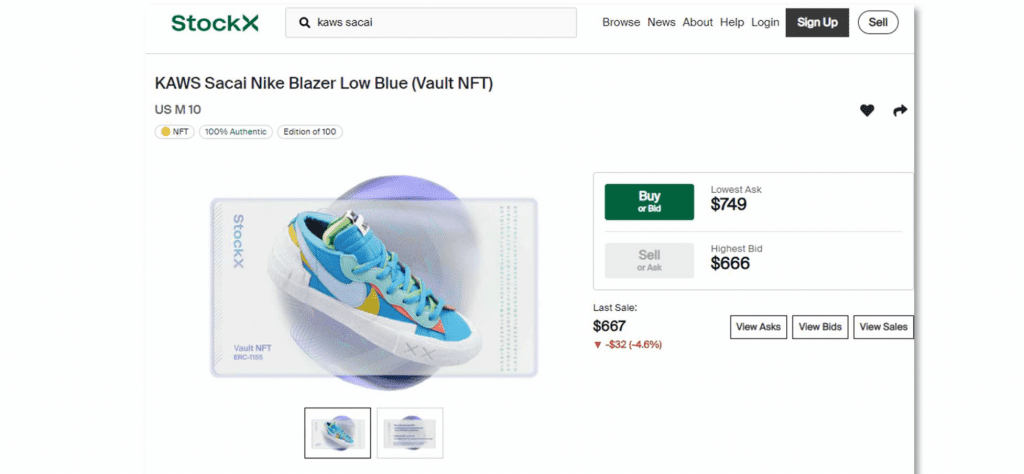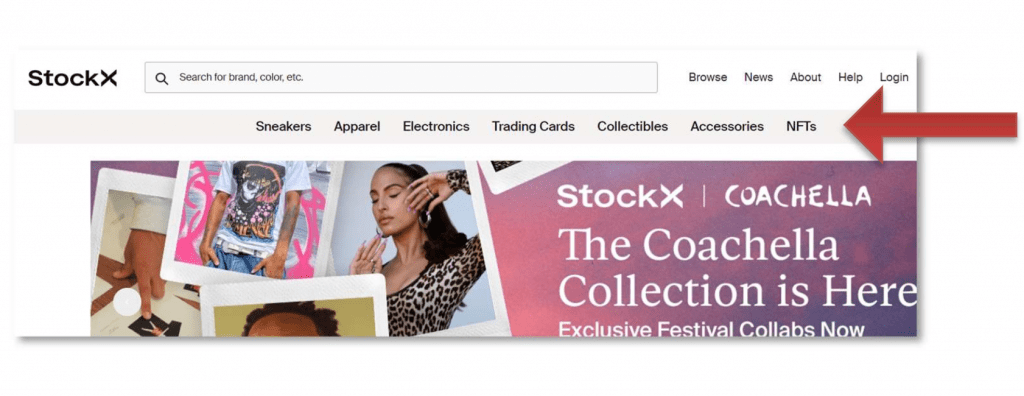Warming up to the Future of Retail: Customer Centric, Technology First
SOURCE: HTTPS://WWW.INDIANRETAILER.COM/
NOV 06, 2023
Nike Adds Counterfeiting, False Advertising Claims to Case Against StockX
SOURCE: THEFASHIONLAW.COM
MAY 31, 2022

Nike is doubling-down on its case against StockX, lodging an amended complaint against the sneaker/fashion marketplace site and adding counterfeiting and false advertising to its lineup of existing claims in the process. On the heels of seeking a leave from the court to amend the non-fungible token (“NFT”)-centric complaint that it filed against StockX early this year, Nike has filed a new complaint, claiming that since it initiated the matter in February, a number of things have changed. StockX has altered the terms under which it is offering up the Vault NFTs, for one thing, while Nike claims that it has discovered the alleged sale of counterfeit sneakers, included Nike branded ones, by StockX.
In the amended complaint that it filed on May 25, Nike adds counterfeiting and false advertising to its existing trademark infringement and dilution, and false designation of origin claims (more about Nike’s original claims here), and requests that the court “swiftly and permanently stop StockX from continuing to sell Vault NFTs bearing Nike’s famous marks, selling counterfeit Nike goods, and making false and/or misleading claims regarding the purported authenticity of those goods.” Among the most interesting aspects of Nike’s amended complaint are its focus on StockX’s claims of authenticity (and how it is allegedly using those claims to attract/mislead consumers at Nike’s expense), and Nike’s enduring push to define the Vault NFTs as products in their own right, as distinct from the underlying, physical Nike sneakers that the digital tokens are associated with.
Primarily, Nike takes issue with StockX’s practice of claiming that the Vault NFTs are “100% Authentic” and that they are merely “claim tickets” or “digital receipts” used to “track ownership of a specific physical Nike product that StockX has purportedly authenticated using its ‘proprietary, multi-step authentication process’” These claims, according to Nike, are “intended to explicitly mislead consumers” into believing that Nike has “authorized, approved, sponsored, and/or endorsed StockX’s Vault NFTs” when no such affiliation exists.
Such authenticity-focused claims are particularly problematic, per Nike, as the “confirmed purchase of counterfeit Nike goods on StockX’s platform – including the same style purportedly associated with at least one of the infringing Nike-branded Vault NFTs – confirms that StockX’s claims about its ‘proprietary multi-step verification process,’ ‘100% Verified Authentic,’ and authentication accuracy rate of ‘99.95%’ are false and/or misleading.”

(In a filing earlier this month in which it sought leave to amend its complaint, Nike likened StockX’s use of authentication language to the false advertising claim that Chanel lodged against The RealReal. According to Nike, just as Chanel asserted in its case against the reseller (which previously advertised that “it ‘ensure[s] that every item on TRR is 100% the real thing, thanks to our dedicated team of authentication experts,’” despite offering up alleged counterfeits), Nike makes “plausible claims for counterfeiting and false advertising because the proposed [amended complaint] sufficiently alleges that StockX has been and is currently dealing in counterfeit Nike goods, which renders false and/or misleading StockX’s ‘100% Verified Authentic’ claims and its claims about the ‘proprietary multi-step verification process’ it employs to authenticate goods.”)
The underlying argument – and problem – here, per Nike, is that by peddling products as “100% Verified Authentic,” StockX is looking to trade on the reputation and appeal of the Nike brand. “StockX built its secondary market business by exploiting the immense goodwill and reputation that Nike has amassed through many years as the world’s leading designer, developer, marketer, and seller of athletic footwear and apparel,” the Swoosh claims. “Now, recognizing firsthand the immense value of Nike’s brands, StockX chose to enter the lucrative NFT market, not by taking the time to develop its own intellectual property rights, but rather by blatantly freeriding, almost exclusively, on the back of Nike’s famous trademarks and associated goodwill.”
Nike adds that aside from marketing the Vault NFTs and corresponding products as authentic, StockX, “recognizing the tremendous value of the Nike brand to consumers,” is also using Nike’s trademarks and images of Nike’s products to “promote its Vault NFTs on the StockX website, StockX app, and on StockX’s social media accounts” beyond the scope of what is necessary. “StockX’s use of Nike’s marks is … intentionally deceiving consumers into believing that Nike sponsors or approves of the Vault NFTs,” Nike argues, stating that “to the extent that the Vault NFT is merely supposed to function as a ‘digital receipt’ for a physical Nike shoe, there is no legitimate reason for StockX to prominently feature Nike’s trademarks on the Vault NFT and the StockX product page.”
Another one of the interesting aspects of Nike’s amended complaint (and the case generally) is the sportswear giant’s attempt to establish what – exactly – the Vault NFTs are. Specifically, Nike is looking to position the digital tokens as products that are distinct from the physical Nike sneakers that they are associated with (obviously as an attempt to sidestep any first sale doctrine shield that may otherwise be enjoyed by StockX). According to Nike, “StockX’s Nike-branded Vault NFTs, whose purchasers can trade or collect and admire in their ‘NFT Portfolios,’ are, in fact, new virtual products that StockX has bundled with additional StockX services (e.g., ‘Vault Services’) and unspecified benefits (e.g., ‘exclusive access to StockX releases, promotions, events’).”
Specifically, Nike claims that StockX is treating the NFTs as products by creating an NFT “category” on its website that is “separate from the categories of physical goods that have been historically available for resale on [its] platform.” Beyond that, Nike alleges that the language that StockX uses suggests that the NFTs, themselves, are the products. For instance, Nike contends that “upon purchase of a Vault NFT, the StockX website confirms to the consumer that they have bought an NFT (not a pair of physical shoes) by stating: ‘Congratulations, you successfully bought StockX Nike Dunk Low Retro White Black (Vault NFT) on StockX. The NFT has now been added to your StockX Portfolio’ and allowing the consumer to ‘share’ the NFT purchase via e-mail or social media.”

“Nowhere on the StockX Order Confirmation webpage or StockX Order Confirmation e-mail does StockX expressly state that the consumer purchased a physical item instead of an NFT,” Nike argues. “StockX does not inform the consumer that it bought a ‘claim ticket’ linked to an underlying physical item. StockX does not state: ‘Congratulations, you just bought a pair of Nike or Jordan shoes.’” Instead, Nike claims that StockX “congratulates the consumer on purchasing an NFT because the NFT is the product that the consumer purchased.”
As for the benefits that come with the Vault NFTs, Nike claims that as of the time that it filed this action, StockX was marketing the Vault NFTs as “offering owners the opportunity to invest in current culture, with cross-platform liquidity on the horizon,” and stating that holders of the NFTs “may be granted exclusive access to StockX benefits, promotions, experiences, and rewards.”
Ultimately, “While StockX represents that the Vault NFTs are ‘backed by’ and confer title to genuine Nike products,” Nike states that “StockX has marketed them as bundled with additional digital goods, services, and unspecified benefits in such a manner that the Vault NFTs constitute new, unauthorized products created, marketed, offered for sale, and sold by StockX, exclusively on the StockX website and StockX app.”
The issue with that, according to Nike, is that the “unsanctioned products” that are being offered up by StockX “have been created, marketed, offered for sale, and sold by StockX using Nike’s trademarks without Nike’s consent,” and that they are likely to “confuse consumers, create a false association between those products and Nike, and dilute Nike’s famous trademarks.”
In a statement in response to Nike’s earlier filing, a spokesman for StockX stated, “We take customer protection extremely seriously, and we’ve invested millions to fight the proliferation of counterfeit products that virtually every global marketplace faces today. Nike’s latest filing is not only baseless but also is curious given that their own brand protection team has communicated confidence in our authentication program, and that hundreds of Nike employees – including current senior executives – use StockX to buy and sell products. This latest tactic amounts to nothing more than a panicked and desperate attempt to resuscitate its losing legal case against our innovative Vault NFT program that revolutionizes the way that consumers can buy, store, and sell collectibles safely, efficiently, and sustainably. Nike’s challenge has no merit and clearly demonstrates their lack of understanding of the modern Marketplace.”
For a look at how lawsuits over NFTs (including this one) are bringing brands’ “real” world issues into the metaverse, you can find that here.
The case is Nike, Inc. v. StockX LLC, 1:22-cv-00983 (SDNY).
LATEST NEWS
WHAT'S TRENDING


Data Science
5 Imaginative Data Science Projects That Can Make Your Portfolio Stand Out
OCT 05, 2022

SOURCE: HTTPS://WWW.INDIANRETAILER.COM/
NOV 06, 2023
SOURCE: HTTPS://DIGIDAY.COM/
SEP 22, 2023
SOURCE: HTTPS://WWW.EXCHANGE4MEDIA.COM/
AUG 21, 2023
SOURCE: HTTPS://WWW.SCIENCEDAILY.COM/
AUG 14, 2023
SOURCE: HTTPS://WWW.EY.COM/EN_IN/FUTURE-CONSUMER-INDEX/CONSUMER-IS-THE-KING-CONSUMER-EXPERIENCE-IS-THE-PRIORITY
JUN 30, 2023
SOURCE: HTTPS://WWW.PITCHONNET.COM/MARKETING-MOMENTS/HOW-CREATIVE-TECH-IS-SCRIPTING-A-NEW-FUTURE-IN-INDIAN-ADVERTISING-32957.HTML
JUN 27, 2023
SOURCE: HTTPS://WWW.BUSINESSINSIDER.IN/BI-INTELLIGENCE/NEWS/CHATGPT-AND-GENERATIVE-AI-IN-MEDIA-AND-ADVERTISING-WITH-USE-CASES-SET-THE-BATTLE-FOR-HEARTS-AND-MINDS-BEGINS/ARTICLESHOW/100286369.CMS
JUN 26, 2023
SOURCE: ARIN WAICHULIS II HTTPS://9TO5MAC.COM/2023/01/22/APPLES-ICONIC-1984-SUPER-BOWL-AD-AIRED-ON-THIS-DAY-39-YEARS-AGO/
JAN 22, 2023